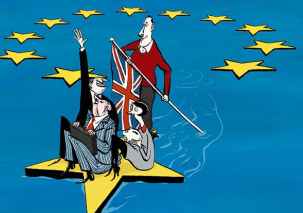
Intrepidly, the BBC dared recently to visit Dover, Delaware – source, it implied, of starvation in Gaza. I listened carefully as its State Department correspondent, Tom Bateman, hunted down the Gaza Humanitarian Foundation in the state which, he explained, is ‘a corporate haven for those who like privacy’. Brave Tom did not find much, but that only proved to him that ‘The main ingredients of this aid are its politics’. The foundation’s chairman says he is a Christian Zionist which, for the BBC, is almost as bad as saying you are a neo-Nazi. The portentousness aside, it is reasonable to ask tricky questions of the American/Israeli organisation which claims it can solve aid in Gaza. The BBC’s problem is that it would never, ever apply its investigative zeal to the cartel currently responsible for the aid that seems not to get through. When has it ever doorstepped the UNWRA operatives who moonlight for Hamas? When has it ever challenged the political ‘ingredients’ of UN agencies as they heap abuse on Israel and stay respectfully silent about Hamas? When has it complained that Hamas does not answer its calls? Perhaps Hamas does answer, welcoming the BBC’s trusting approach.
The Office of Rail and Road has noticed that our railway system comes down too hard on the innocent. Yes. The weekend before last, about to return from Newcastle, I found I had lost my ticket. I went to the ticket office, bearing my complete receipt, which even included my seat reservation. The man was pleasant, but said there was no way I could have a free new ticket or even an eventual refund. So I had to pay £133 (nearly £50 more than I had already paid) to travel. Approaching the train, I noticed that the barrier was open. Boarding, I found the computer seat reservations had all gone down. Alighting at King’s Cross, I realised that no guard had checked my ticket on the journey and that the barriers were open and unmanned. So if I had ‘cheated’, I would have been unmolested but because I had owned up, I was out of pocket. Obviously this all started with my carelessness, but why can rail companies treat one as guilty until proven innocent though English law says the opposite?
I spoke twice in Oxford last week to highly intelligent, mainly undergraduate audiences. The atmosphere reminded me of 1980s secret meetings of dissidents behind the Iron Curtain arranged by British intellectuals, such as Roger Scruton, who were smuggled in. One encountered young people who feared discovery but showed a touching belief in the life of the mind as they thirsted for freedom in the desert of enforced conformity. For the sake of their careers, I shall not reveal who my audiences were.
From one attendee, I learnt that in Mods, the first half of the Oxford four-year Classics degree, one no longer studies Virgil or Homer. Instead, the only compulsory texts are Terence and Plautus. This is like reading theology without studying the Old or New Testaments (which, come to think of it, is probably now commonplace). Are there any subjects, outside the liberal arts, in which each generation is encouraged to know less than the previous one? Are there physics degrees which drop quantum theory, or maths ones without calculus? We have contrived a culture in which universities grow, yet knowledge shrinks.
As a graduate of Cambridge, I am depressed by my university’s decision to open up the Chancellorship to all of us. We always felt smug about Oxford’s beauty contest between superannuated politicians. Ours was uncontested. Now we have to endure a dingier version of the Oxford rhodomontade. The Chancellor of Cambridge should not strike attitudes or take sides, as a vote compels. He or she should be unspeakably grand/rich/disinterested. For many years, the late Duke of Edinburgh held the post, faction-free, because he was married to the then Queen, had a mind of his own and had never been to a university. After Prince Philip, our Chancellor was Lord Sainsbury of Turville, a blamelessly benevolent prince of commerce. Now there are ten candidates, all with ‘statements’ staking their claims. Gina Miller, the eurofanatic, wishes to ‘affirm Cambridge’s commitment to modernity and equality’. Sandi Toksvig, the television personality, says she speaks up for ‘equity, inclusion, rewilding, sustainability and tackling online bias’. We don’t want someone who speaks up. Why can’t we have the present Duke of Edinburgh, alumnus of Jesus College, who gives diligent public service and will therefore remain silent?
There are a great many stories about ransomware and the damage it causes. Presumably these attacks happen mainly because the businesses attacked pay the ransom. One never reads about this, or how criminals get away with the money. If a business pays, is it acting legally? If a public limited company pays a ransom, could shareholders sue? If, on the contrary, it is argued that paying the ransom is good for shareholders, could they sue a company that refused to pay?
Friends tell me – and I believe them – that Chloe Dalton’s new book Raising Hare is excellent. It does not automatically follow that she is right to call for a new law to impose a close season on hare-culling. The patchy shortage of hares (in some places, the fields are teeming with them) is not attributable to shooting but to habitat loss, vermin and European Brown Hare Syndrome. Besides, as is so often the case when people itch to legislate, there is a relevant law already. Under the Hares Preservation Act 1892, it is an offence to sell, or expose for sale, any hare or leveret between the months of March and July inclusive. Hares may only be sold if shot between 1 August and the last day of February. There is therefore no commercial incentive to orphan a hare in the breeding season.








Comments